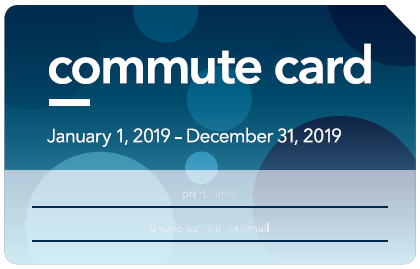Starting in 2020, Metro's Commute Card for Business will be capped every month at the cost of the regular Unlimited Ride Pass. What is a Commute Card for Business and why is it capped?
The Commute Card for Business
The Commute Card for Business is a special annual unlimited ride pass that is only available through area organizations and businesses. A generic Commute Card program started about fifteen years ago as a mutually beneficial way to support and increase bus ridership, worker benefits and/or lessen transportation costs and the demand for parking in land-locked areas. It involved such large educational and health organizations as the UW-Madison's Associated Students of Madison (ASM) and the UW Hospitals and Clinics a well as some businesses.
The original organizations still have special pass programs, but the Commute Card for Business3 is now its own program. It is specially designed to enable employees, employers or both to benefit from the pre-tax payroll deduction available for commuters under the federal "Commuter Choice" law.4 Other fare options -- a base cash fare, 10-ride card, or 31-day unlimited ride pass – are still available, but may not be as preferable.
Metro's own administration of the program is minimal. After providing information to help an organization or business use the program, its activities are limited to delivering the cards to the business or organization, keeping track of the number of times a card is swiped through a fare box (via its serial number) and then once a month issuing an invoice to the organization based on that information. The business or organization does the rest.
Capping the Commute Card for Business
The reason the Commute Card for Business is capped at the cost of a regular 31-day Unlimited Ride Pass has to do with how the Card handles transfers given that Metro wants to encourage bus use. Capping helps reduce the potential financial penalty associated with having to transfer when using the Commute Card.
Metro uses terms such as "trip" one way when referring to its base fares but tallies its monthly statistics and Commute Card use according to a different way. Following the Federal Transit Administration, Metro considers a Commute Card "trip" to be a bus ride without a transfer ("unlinked passenger trip").6 Every time someone uses a transfer, they are taking a separate "trip". Thus if you travel from your home to a transfer point and then change buses to complete your journey, you have taken two "trips." If your home is outside one transfer point and your workplace is outside another, you are taking three "trips."
Metro's base fares include the cost of those transfers. The Commute Card ride does not. Rather, if a transfer is involved, the cost of a journey with the Commute Card is $1.40 times the number of legs of the journey, whether two legs at $2.80, three legs at $4.20 or even more. This definitional nicety is not something Metro is proud of, causes a misinterpretation of its reporting of "ridership," and is one cause of Madison's transportation inequity, but it is a rule imposed by the Federal Transit Administration.
The result is that the Commute Card can be a good deal for a bus rider or his/her employer if he/she rides only one bus to work since the cost of that ride is less than the base fare. But it is not a good deal if someone has to transfer one or more times to get to work. Capping Commute Card use in any month at the cost of a 31-day unlimited ride pass can make it comparable to the best of the other options available when the Card is used maximally, thus encouraging bus use and being more aligned with "transportation equity."
A Step in the Right Direction, is Capping the Commute Card for Business Best?
One has to wonder how long capping the charge for using the Commute Card will hold however. While every year, Metro makes routing changes that require more transferring, the financial implications of such change for using the Commute Card largely go unnoticed. That will not be the case in the future if Bus Rapid Transit does indeed come to Madison however. At that point, there could be a lot of transferring between local and rapid lines, and much more attention paid to the differential treatment of the word "trip" for special passes and individual fares. Will the pre-tax benefit associated with the Commute Card program then be worth it? Perhaps or perhaps not.





